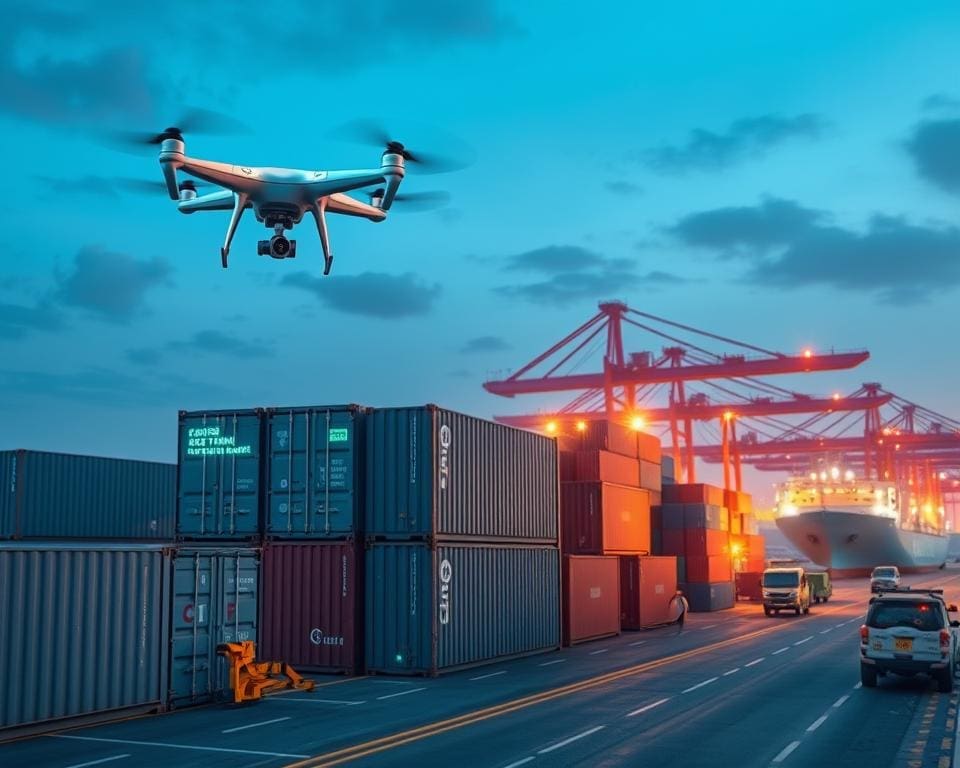In a world where logistics operations are increasingly complex, achieving unparalleled shipping efficiency has never been more crucial. The paradigm is shifting towards tech for real-time cargo tracking, which promises to revolutionise how businesses manage supply chains. By harnessing the power of advanced technology, companies can now optimise their shipping processes, ensuring that goods are tracked and managed with precision and accuracy. As we delve into the impact of these innovations, it becomes evident that embracing digital solutions is essential for those looking to enhance operational performance and ultimately, customer satisfaction.
Understanding Shipping Efficiency in Modern Logistics
Shipping efficiency stands as a cornerstone of contemporary logistics, vital for maintaining competitiveness in an ever-evolving market. Emphasising operational excellence requires an unwavering focus on timely deliveries and cost-effectiveness. The interplay between these factors ultimately enhances logistics performance, leading to better service and increased profitability.
The Importance of Shipping Efficiency
Effective shipping strategies significantly influence a company’s ability to meet customer demands. Companies pursuing shipping efficiency are better positioned to adapt to market changes, respond to customer needs, and drive profitability. Implementing efficient operational workflows contributes to reduced delays and streamlined processes, ensuring that goods reach their destination without unnecessary complications.
Key Metrics for Measuring Efficiency
To gauge shipping efficiency accurately, businesses rely on several key metrics. These include:
- Order accuracy: Ensuring that the right products are delivered on time.
- Transit times: Tracking the length of time taken for shipments to arrive.
- Resource utilisation rates: Measuring the effectiveness of resources deployed in the shipping process.
By scrutinising these metrics, businesses can identify areas for improvement, leading to enhanced operational efficiency and overall shipping effectiveness. Continuous improvement in these areas fosters an environment where logistics performance flourishes.

The Role of Technology in Cargo Tracking
Technology has transformed the world of logistics, significantly enhancing the way cargo is tracked and managed. With the rise of emerging technologies, companies now have access to tools that deliver unparalleled visibility and efficiency. For instance, innovations such as GPS, RFID, and blockchain are at the forefront of this revolution, enabling businesses to monitor their shipments in real-time and respond swiftly to any changes.
Emerging Technologies in the Shipping Industry
The integration of cargo tracking technology into logistics operations has catalysed a shift from traditional methods. Companies utilise tools such as:
- GPS for accurate location tracking
- RFID tags for automated data capture
- Blockchain to enhance transparency and security
These advancements have not only improved tracking precision but have also facilitated better communication across supply chains.
Comparative Analysis of Traditional vs. High-Tech Cargo Tracking
While traditional cargo tracking methods relied heavily on manual entry and paper documentation, high-tech solutions provide significant advantages. Key differences include:
- Real-time updates versus periodic reporting
- Automated data collection versus human input
- Greater accuracy reducing human error
These factors underscore the importance of modernisation in cargo tracking, highlighting how emerging technologies can lead to more informed decision-making and enhanced operational agility.
Shipping Efficiency: Tech for Real-Time Cargo Tracking
In today’s competitive logistics landscape, the need for efficient shipping processes has never been greater. Companies are increasingly adopting innovative solutions that enhance real-time shipment monitoring capabilities. These technologies empower organisations to keep track of their cargo throughout the shipping journey, leading to improved operational efficiency.
Overview of Real-Time Cargo Tracking Solutions
Real-time cargo tracking solutions utilise various technologies to provide seamless oversight of shipments. Key solutions include:
- IoT devices that collect and transmit data on shipment location.
- Mobile applications that offer users instant access to tracking information.
- Cloud-based platforms that centralise data for easy accessibility.
These advancements enable logistics providers to respond swiftly to any disruptions in the supply chain, ensuring that customer expectations are met consistently.
Impact on Operational Efficiency and Cost Reduction
The implementation of real-time shipment monitoring has a transformative effect on operational efficiency. Faster response times reduce delays, allowing businesses to streamline their logistics activities. Enhanced visibility leads to proactive decision-making, which significantly contributes to cost reduction. Businesses can identify inefficiencies and restructure their processes, ultimately driving profitability. By embracing these technological advancements, companies not only optimise their shipping operations but also establish a competitive edge in the market.
Benefits of Real-Time Shipment Monitoring
Real-time shipment monitoring has transformed logistics operations, offering a wealth of benefits that propel businesses towards greater efficiency. Accurate tracking systems not only provide timely updates but also enhance customer satisfaction through transparency. Reliable information regarding shipment status builds trust with clients and establishes long-lasting relationships.
Improving Customer Experience and Satisfaction
With real-time shipment monitoring, customers feel more in control of their orders. They receive immediate notifications about their cargo’s location, estimated delivery times, and any potential delays. This level of engagement significantly boosts customer satisfaction. Businesses leveraging this technology can expect improved feedback and repeat business, reinforcing the importance of maintaining high service standards.
Reducing Delays in the Supply Chain
Delays within the supply chain can lead to lost revenue and dissatisfaction. Real-time shipment monitoring facilitates quicker response times, allowing companies to proactively address issues before they escalate. By optimising routes and improving communication among supply chain partners, businesses can ensure timely deliveries. The resulting efficiency directly correlates to enhanced supply chain optimisation and overall operational excellence.
Utilising Freight Tracking Systems for Enhanced Visibility
In today’s rapidly evolving logistics landscape, freight tracking systems play a pivotal role in delivering enhanced visibility throughout supply chains. Various types of systems offer unique features that can significantly improve operational efficiencies.
Types of Freight Tracking Systems Available
Numerous freight tracking systems cater to different operational needs, including:
- GPS Tracking – Utilises satellite technology to provide real-time location data of shipments.
- Augmented Reality Solutions – Integrates digital information into the real-world environment for intuitive navigational assistance.
- Advanced Analytics Platforms – Leverages big data to analyse patterns and predict potential disruptions in the supply chain.
Integration with Existing Logistics Monitoring Software
For companies seeking to optimise their logistics operations, the integration of freight tracking systems with existing logistics monitoring software is paramount. This combination ensures a seamless flow of information, fostering comprehensive visibility across the entire supply chain. The attributes of such integration include:
- Consolidated data dashboards that facilitate informed decision-making.
- Real-time updates on shipment statuses, enhancing responsiveness.
- Streamlined communication between stakeholders, creating synergy in operations.
Innovations in Digital Cargo Tracking
The logistics landscape is evolving rapidly, driven by advancements that enhance digital cargo tracking systems. At the forefront of these innovations are the Internet of Things (IoT in shipping) and artificial intelligence (AI), technologies that revolutionise how cargo is monitored throughout its journey. These tools enable companies to harness predictive analytics, automate alerts, and improve overall shipment accuracy.
Utilising IoT and AI for Enhanced Tracking Capabilities
By integrating IoT devices within cargo tracking solutions, organisations can generate real-time data, leading to improved decision-making capabilities. This integration allows for:
- Predictive analytics, which foresees potential delays and informs proactive measures.
- Automated alerts that keep stakeholders updated about the shipment status.
- Enhanced accuracy in monitoring, reducing errors associated with manual tracking methods.
Case Studies of Successful Implementations
Several companies have showcased successful implementations of digital cargo tracking innovations. These cases highlight the practicality and effectiveness of IoT and AI in optimising logistics operations. Notable examples include:
- Maersk: Utilising IoT sensors in refrigerated containers, ensuring real-time temperature monitoring, leading to a significant reduction in spoilage.
- FedEx: Implemented AI-driven analytics for shipment routing, achieving faster delivery times and reduced operational costs.
- DHL: Adopted smart bracelets for workers in warehouses, enhancing the accuracy of inventory management during transfers.
The Future of Shipping Efficiency and Real-Time Tracking
As we look towards the future of shipping efficiency, it becomes increasingly clear that real-time tracking is set to redefine the way logistics operate. With the continued rise of logistics innovations, such as advanced tracking software and the Internet of Things, businesses are empowered to not just monitor their shipments but to analyse and optimise their entire supply chain in real-time. This technology enables unprecedented transparency and accountability, leading to a more streamlined workflow.
The implications of emerging technologies extend beyond mere visibility. Innovations like autonomous vehicles and drone deliveries are making significant strides in the logistics sector, paving the way for faster and more efficient transport solutions. These advancements promise to reshape operational strategies, reducing delays and increasing reliability. Companies that embrace these transformative tools will undoubtedly gain a competitive edge in a rapidly evolving market.
In preparing for what lies ahead, stakeholders must embrace a culture of adaptability and innovation. By integrating real-time tracking systems and leveraging cutting-edge logistics innovations, businesses stand to enhance their operational capabilities significantly. The future of shipping efficiency is bright, and those who invest in the latest technologies will be well-positioned to thrive in an increasingly demanding environment.








